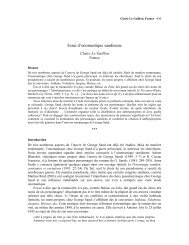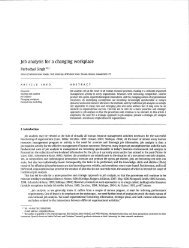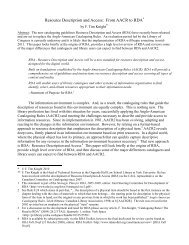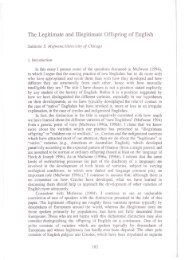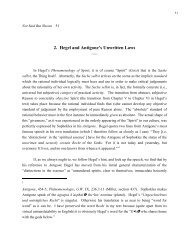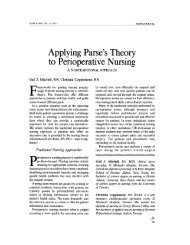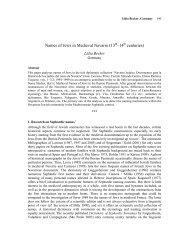Names in Multi-Lingual, -Cultural and -Ethic Contact - YorkSpace
Names in Multi-Lingual, -Cultural and -Ethic Contact - YorkSpace
Names in Multi-Lingual, -Cultural and -Ethic Contact - YorkSpace
Create successful ePaper yourself
Turn your PDF publications into a flip-book with our unique Google optimized e-Paper software.
Reg<strong>in</strong>a Kvašytė, Lithuania 618<br />
Proper <strong>Names</strong> <strong>in</strong> the Lithuanian Translation of<br />
Yann Martel’s Life of Pi<br />
Reg<strong>in</strong>a Kvašytė<br />
Lithuania<br />
Abstract<br />
Proper names which are rendered by various methods are found <strong>in</strong> many works of Canadian literature,<br />
recently translated <strong>in</strong>to Lithuanian. In this paper, I analyze one of these, Yann Martel’s Life of Pi.<br />
Proper names are an important object of literary onomastics; they are important for translation<br />
methodology as well. A translator should be aware of the motivation of the orig<strong>in</strong>al text <strong>and</strong> the author’s<br />
idea <strong>in</strong> order to select a render<strong>in</strong>g method which reflects best the onomastic level of a piece. In fiction, it is<br />
necessary to s<strong>in</strong>gle out the names of exist<strong>in</strong>g places which have an established tradition <strong>in</strong> Lithuanian <strong>and</strong><br />
are used <strong>in</strong> various texts (e.g., Kvebekas ‘Quebec’, Torontas ‘Toronto’); moreover, names <strong>and</strong> family<br />
names of real historical, cultural, or political personalities (e.g., Šekspyras ‘Shakespeare’, Bodleras<br />
‘Baudelaire’, Kenedis ‘Kennedy’) or real anthroponyms which are not related to a particular person<br />
(Dže<strong>in</strong>ė ‘Jane’, ponas Raitas ‘Mr. Right’) should be taken <strong>in</strong>to consideration. A completely different case<br />
occurs with proper names created by an author. Such systems of proper names should also be reflected<br />
exactly <strong>in</strong> a translation. For translators of fiction texts, it is very important to grasp <strong>and</strong> properly apply the<br />
rules for render<strong>in</strong>g proper names <strong>in</strong> order for the orig<strong>in</strong>al not to suffer <strong>and</strong> for a reader to easily underst<strong>and</strong><br />
the sense of proper names <strong>in</strong> a text.<br />
***<br />
Proper names as manifestations of a writer’s style (i.e., subjective depiction of what is objective)<br />
are the object of literary onomastics. The ma<strong>in</strong> groups of proper names s<strong>in</strong>gled out <strong>in</strong> fiction<br />
texts are anthroponyms <strong>and</strong> toponyms. Anthroponyms are names, surnames, nicknames or<br />
pseudonyms – they describe the characters <strong>in</strong> various ways (directly or <strong>in</strong>directly; this is partly<br />
predeterm<strong>in</strong>ed by the genre of a work of fiction <strong>and</strong> an author’s <strong>in</strong>tentions). The same can be<br />
said about toponyms. If deal<strong>in</strong>g with proper names <strong>in</strong> translated works <strong>in</strong> another language, not<br />
their translation, but render<strong>in</strong>g is taken <strong>in</strong>to consideration. Render<strong>in</strong>g of such names <strong>in</strong> a fiction<br />
text cannot be separated from the motivation for their selection <strong>in</strong> the orig<strong>in</strong>al; that is why both<br />
the strategy of a translator <strong>and</strong> the hierarchy of proper name equivalents <strong>in</strong> the translation of a<br />
work are closely related with an author’s <strong>in</strong>tentions.<br />
Canadian literature is familiar to Lithuanian readers, even though it is not the most popular<br />
foreign country whose literature is translated <strong>in</strong>to Lithuanian. It is obvious that Anglophone<br />
Canadian literature has been translated more numerously, <strong>and</strong> only very few pieces have been<br />
translated from Canadian Francophone literature. Recently, translations of works newly written<br />
<strong>and</strong> published <strong>in</strong> Canada have appeared as well. One of the latter ones was chosen for treatment<br />
<strong>in</strong> this paper. It is the English translation by Edita Mažonienė of Yann Martel’s novel Life of Pi<br />
published <strong>in</strong> 2001; it was published <strong>in</strong> Lithuanian under the title Pi gyvenimas <strong>in</strong> 2004 <strong>in</strong> Vilnius<br />
(publisher “Jotema”). Newness of the novel was not the ma<strong>in</strong> criterion for select<strong>in</strong>g this work for<br />
this paper; however, it was also taken <strong>in</strong>to consideration. The major motive was the fact that the<br />
novel is rich <strong>in</strong> various proper names; the Lithuanian usage of these is worth pay<strong>in</strong>g attention to<br />
from the po<strong>in</strong>t of view of literary onomastics.
Reg<strong>in</strong>a Kvašytė, Lithuania 619<br />
Onomastic lexis of any work of fiction is a certa<strong>in</strong> geo-l<strong>in</strong>guistic reflection of the world.<br />
Such an aspect was employed <strong>in</strong> a previous analysis of Lithuanian translations of works by<br />
several Canadian writers: Gabriel Roy’s novel Netikėta laimė [Bonheur d’occasion]<br />
(Kačiuškienė, Kvašytė 2008) <strong>and</strong> Robert Br<strong>in</strong>ghurst’s poetry book Kvėpuoti pėdomis [Breath<strong>in</strong>g<br />
Through the Feet] (a report on this was presented at the conference on Canadian Studies <strong>in</strong> Tartu<br />
<strong>in</strong> 2007). However, onomastic lexis is also a vivid <strong>in</strong>dividual feature of a writer. Various<br />
l<strong>in</strong>guistic levels are employed for actualis<strong>in</strong>g a proper name: semantic, word-build<strong>in</strong>g (the<br />
structure of a name), grammatical (declension) <strong>and</strong> phonetic.<br />
Proper names <strong>in</strong> the novel Life of Pi are analysed on the basis of distribution of them <strong>in</strong>to<br />
personal names <strong>and</strong> place names; also, some reronyms are discussed as well. These can be the<br />
true translation, substitution (usage of a national analogue), transcription or other direct shift<br />
from the orig<strong>in</strong>al form <strong>in</strong>to the translated text as an onomastic equivalent, i.e., presentation of a<br />
phonetic form, or transcription, explanatory translation, specified translation, descriptive<br />
translation or transform<strong>in</strong>g translation (Bormane 2006: 59). Moreover, it should be noted that<br />
proper names used <strong>in</strong> translations must follow the general rules for render<strong>in</strong>g foreign language<br />
proper names applied <strong>in</strong> Lithuania. Yet, they must reta<strong>in</strong> specificity of a fiction text as well.<br />
Personal names are the names, surnames or nicknames of characters that were created by an<br />
author as well as of real <strong>in</strong>dividuals. First of all, it should be mentioned that the present paper<br />
does not take <strong>in</strong>to consideration the types of name systems <strong>in</strong> works of fiction, i.e., ma<strong>in</strong>,<br />
secondary or episodic characters, names which are mentioned <strong>in</strong> an author’s text or <strong>in</strong> a dialogue<br />
of characters, etc. It is so because the object of the research is English proper names rendered<br />
<strong>in</strong>to Lithuanian. And this is not related to the author’s <strong>in</strong>tentions <strong>and</strong> motivation for a particular<br />
choice; it only reflects it. However, it is impossible to completely disregard it, as the revelation<br />
of an author’s idea requires from a translator some specific knowledge, sharp eye <strong>and</strong><br />
sophistication. Moreover, <strong>in</strong>deed, the most important <strong>and</strong> complicated th<strong>in</strong>g is to transfer names<br />
of ma<strong>in</strong> characters.<br />
As far as the chosen novel is concerned, the most <strong>in</strong>terest<strong>in</strong>g fact is the story of the name of<br />
the protagonist, a fourteen-year-old Indian boy. Quite a lot of the novel’s text is dedicated to it;<br />
<strong>and</strong> the translator should reflect all the nuances. It has been logically said that “the name should<br />
suit the character, constitute [the character’s] core” (Florenskij 1998 – <strong>in</strong> Bormane 2006: 47). It<br />
predeterm<strong>in</strong>es the character of a personage. Proper names of a fiction text show the mean<strong>in</strong>g <strong>in</strong><br />
relation to the whole; they are motivated by the author’s idea <strong>and</strong> structure of the whole work.<br />
The orig<strong>in</strong> of the boy’s name <strong>and</strong> the peculiarities of its usage are described as follows:<br />
Štai taip gavau sau vardą, kai atėjau į šį pasaulį – paskut<strong>in</strong>is, laukiamas šeimos papildymas, treji<br />
metai po Ravio – Pis<strong>in</strong>as Molitoris Patelas (18)<br />
[That is how I got my name, when I entered this world, a last, welcome addition to my family,<br />
three years after Ravi: Pisc<strong>in</strong>e Molitor Patel (13)].<br />
The translator presents a commentary by way of a footnote: Pisc<strong>in</strong>e Engl. – fishy. The literary<br />
scholar, Rūta Šlapkauskaitė, who analysed the novel states: “The fact that the translator expla<strong>in</strong>s<br />
its [the name Pisc<strong>in</strong>e] ambivalence, which the author creatively plays with, is worth much<br />
prais<strong>in</strong>g. However, it seems that this chapter of the novel where it is stated that Pisc<strong>in</strong>e was<br />
given the name “pagal plaukimo base<strong>in</strong>ą” (15) has not been closely read. It should be assumed<br />
that the word “pisc<strong>in</strong>e” <strong>in</strong> French means “a swimm<strong>in</strong>g pool” <strong>and</strong> the name Pisc<strong>in</strong>e Molitor is a<br />
direct reference to Molitor swimm<strong>in</strong>g pool <strong>and</strong> not to the mean<strong>in</strong>gful aspect of a “fish” as is<br />
stated <strong>in</strong> the footnote (18). Bear<strong>in</strong>g <strong>in</strong> m<strong>in</strong>d that Martel speaks both English <strong>and</strong> French fluently,<br />
this misunderst<strong>and</strong><strong>in</strong>g could be avoided. Otherwise, we are unconsciously caught up <strong>in</strong> the<br />
Canadian bil<strong>in</strong>gual identity (Šlapkauskaitė 2006: 4). However, it should be noted that such<br />
misunderst<strong>and</strong><strong>in</strong>g is given mean<strong>in</strong>g <strong>in</strong> the commentary where the word pisc<strong>in</strong>e is translated from
Reg<strong>in</strong>a Kvašytė, Lithuania 620<br />
English as fishy, <strong>and</strong> not <strong>in</strong> the translation of the novel itself. Still it is <strong>in</strong>terest<strong>in</strong>g that the<br />
English form is be<strong>in</strong>g used <strong>in</strong> other places, even though with attached Lithuanian <strong>in</strong>flection –<br />
Pisc<strong>in</strong>as (e.g., <strong>in</strong> the article by Valdas Petrauskas, 2002. The relation between written form <strong>and</strong><br />
pronunciation reveals many <strong>in</strong>terest<strong>in</strong>g th<strong>in</strong>gs: the name Pi is written <strong>in</strong> both languages<br />
identically; however, the pronunciation differs: <strong>in</strong> Lithuanian it is [pi] <strong>and</strong> <strong>in</strong> English – [pai]. It is<br />
highlighted <strong>in</strong> the commentary by the translator: “Word-play; the boy’s name Pi <strong>in</strong> English is<br />
pronounced pai, as <strong>in</strong> Lemon Pie (30). We meet this variant of pronunciation <strong>in</strong> the novel text<br />
when an older brother Ravi tries to f<strong>in</strong>d out how Pisc<strong>in</strong>e has changed his name <strong>in</strong> order that his<br />
contemporaries would not tease him as they used to call him a Pisser. And the nickname<br />
occurred due to another consonance which is presented by Yann Martel <strong>in</strong> the follow<strong>in</strong>g way:<br />
He raised his arm, po<strong>in</strong>ted at me <strong>and</strong> shouted: “It’s Piss<strong>in</strong>g Patel!” (25) [the word Piss<strong>in</strong>g <strong>in</strong><br />
novel’s orig<strong>in</strong>al is typed <strong>in</strong> italics], <strong>and</strong> the translator comments on it <strong>in</strong> a such way: “My name<br />
is not yet the whole story about my name. When your name is Bob no one asks how to write it.<br />
And with Pisc<strong>in</strong>e Molitor Patel is different. Some used to underst<strong>and</strong> it as P. S<strong>in</strong>gh <strong>and</strong> that I<br />
was a Sikh <strong>and</strong> they used to be surprised why I did not wear a turban […] – He is a Pisser<br />
[Pisc<strong>in</strong>e <strong>in</strong> English sounds very similar to piss<strong>in</strong>g – Comment by the translator] Patel! (26).<br />
Valdas Petrauskas, an outst<strong>and</strong><strong>in</strong>g translator of works by Canadian authors, who lives <strong>in</strong><br />
Toronto, writes: “In general, the book can be described as a manual of search<strong>in</strong>g for God or<br />
spiritual development. A teenager Pisc<strong>in</strong>e Molitor Patel (given a baptismal name by a family<br />
friend-swimmer after his most favourite French swimm<strong>in</strong>g pool) solves the questions be<strong>in</strong>g<br />
raised for thous<strong>and</strong>s of years <strong>in</strong> the middle of the sea: what is God? Where <strong>and</strong> how can one f<strong>in</strong>d<br />
him? He tried to f<strong>in</strong>d answers to these questions earlier by pos<strong>in</strong>g them with uneas<strong>in</strong>ess to the<br />
closest friends: a Catholic priest, a Muslim imam <strong>and</strong> a H<strong>in</strong>du p<strong>and</strong>it. Dur<strong>in</strong>g the journey, the<br />
way towards spiritual perfection is revealed to himself. How does Pisc<strong>in</strong>e Molitor Patel, or<br />
shorter – Pi, show up <strong>in</strong> the ocean?” (Petrauskas 2002: 2) What the orig<strong>in</strong> of such a shorten<strong>in</strong>g<br />
is, is expla<strong>in</strong>ed by a quotation from the text which is graphically highlighted <strong>in</strong> both the orig<strong>in</strong>al<br />
<strong>and</strong> translation:<br />
Mano vardas yra<br />
Pis<strong>in</strong>as Molitoris Patelas,<br />
visiems ž<strong>in</strong>omas kaip<br />
– dukart pabraukiau dvi pirmąsias savo vardo raides –<br />
Pi Patelas.<br />
Kad būtų aiškiau, dar pridėjau:<br />
π – 3,14<br />
ir nubrėžiau didžiulį apskritimą, kurį po to padalijau skersmeniu į dvi dalis, kad prim<strong>in</strong>čiau tą<br />
elementarią geometrijos pamoką (28–29).<br />
Cf. the English text:<br />
My name is<br />
Pisc<strong>in</strong>e Molitor Patel,<br />
known to all as<br />
– I double underl<strong>in</strong>ed the first two letters of my given name –<br />
Pi Patel<br />
For good measure I added<br />
π = 3.14<br />
<strong>and</strong> I drew a large circle, which I then sliced <strong>in</strong> two with a diameter, to evoke that basic<br />
lesion of geometry. (28–29).
Reg<strong>in</strong>a Kvašytė, Lithuania 621<br />
Thus, the render<strong>in</strong>g of the name of the protagonist <strong>in</strong> translation is often related with<br />
commentaries which are necessary for a Lithuanian reader <strong>in</strong> order to grasp the word-play <strong>in</strong> the<br />
English language.<br />
Of no lesser importance is the discussion of other characters’ names <strong>in</strong> the novel. These are<br />
not personal names <strong>in</strong> the direct sense because they designate animals – they are zoonyms. At<br />
first, these are the <strong>in</strong>habitants of a zoo which are talked about by the little Pi <strong>and</strong>, later, they are<br />
those which escaped by ship together with the boy; with the foremost of them be<strong>in</strong>g a tiger,<br />
named Richard Parker. On the one h<strong>and</strong>, the attribution of such a name <strong>and</strong> surname to an<br />
animal is paradoxical; on the other h<strong>and</strong>, it is a certa<strong>in</strong> personification, because the child<br />
survives together with this animal <strong>and</strong> the latter leaves a significant impact on the boy’s m<strong>in</strong>d<br />
<strong>and</strong> life. This is what the author says about the choice of animals be<strong>in</strong>g characters <strong>in</strong> the novel:<br />
“[…] I had been th<strong>in</strong>k<strong>in</strong>g for a long time until I made the decision on which animal could be best<br />
suited to be a major character. […] F<strong>in</strong>ally, I made a decision: this would be a tiger. The rest of<br />
the animals – zebra, hyena <strong>and</strong> orang-utan – appeared on a life-boat by themselves; they<br />
symbolize certa<strong>in</strong> human features: the hyena – cowardice, the orang-utan – motherly <strong>in</strong>st<strong>in</strong>cts,<br />
the zebra – exotics. The mongoose was chosen only because of the need for a small animal<br />
similar to a ferret but without the features attributed to it. Moreover, I liked the very word<br />
mongoose because of its poetic sound” (Martel 2002: 10). There are quite a few names <strong>in</strong>vented<br />
on the basis of an animal’s life style or appearance. One of them <strong>in</strong> the orig<strong>in</strong>al text – Orange<br />
Juice – is an orang-utan, to be precise – a female orang-utan. In the translation she is<br />
Oranž<strong>in</strong>ukė. The English word orange is translated <strong>in</strong>to Lithuanian by the adjective oranž<strong>in</strong>is (it<br />
would be more precise to translate it with apels<strong>in</strong><strong>in</strong>is [orange] or apels<strong>in</strong>ų spalvos [of orange<br />
colour]) <strong>and</strong> by a noun apels<strong>in</strong>as [an orange]. A reviewer underl<strong>in</strong>es the improper translation of<br />
the word <strong>and</strong> suggests nam<strong>in</strong>g this animal Apels<strong>in</strong>ukė: “Translation of the name of the female<br />
orang-utan (Orange Juice) <strong>in</strong>to Oranž<strong>in</strong>ukė can be accepted, but still she could be named<br />
Apels<strong>in</strong>ukė which would reta<strong>in</strong> the primary semantic field of the name…” (Šlapkauskaitė 2006:<br />
4) Cf. orange – (Fr. orange) of g<strong>in</strong>ger, orange colour (TŽŽ 2001: 532).<br />
A large group of personal names <strong>in</strong> the novel consists of names of religious characters<br />
because much attention <strong>in</strong> the novel is paid to various religions. These are personal names from<br />
the name system of Christianity – the religion which is predom<strong>in</strong>ant <strong>in</strong> Lithuania; they are<br />
common <strong>and</strong> that is why it is easier to f<strong>in</strong>d the equivalents (<strong>in</strong> this case, there are some examples<br />
of substitution): Matas (Mattheus), Morkus (Mark), Mykolas (Michael), Abraomas (Abraham)<br />
Dovydas (David), Mozė (Moses), Jėzus (Jesus), Izaokas (Isaac). For example, <strong>in</strong> the sentence<br />
Taip sako Matas, paremiamas ir Morkaus (60) it is contextually obvious that the apostles are<br />
mentioned. The English version names of the mentioned apostles are rendered by names which<br />
are common <strong>in</strong> Lithuanian. The name Matas is a Lithuanian shortened name for Motiejus,<br />
which, accord<strong>in</strong>g to the Lithuanian Dictionary of Name Etymology (Kuzav<strong>in</strong>is, Savukynas,<br />
1994), was <strong>in</strong>troduced via Eastern Slavs from the Lat<strong>in</strong>ized Hebrew names Matthaeus <strong>and</strong><br />
Matthias, <strong>in</strong> turn derived from the Hebrew Mattīthjā – “God’s gift”). The name Morkus is a<br />
Lithuanianized form from the Lat<strong>in</strong> name – Marcus (like the suffixal derivation from Mars,<br />
genitive Martis – Marsas, Roman god of war). The name Abraomas is derived from the<br />
Lat<strong>in</strong>ized Hebrew name Abrāhām – “an exalted father; the father of a people”. The name<br />
Dovydas came from the Hebrew Dāvid – “beloved”. The name Mozė was derived from the<br />
Lat<strong>in</strong>ized Hebrew name Moyses, the orig<strong>in</strong> of which is a Hebrew word mōšē “a child, a son”.<br />
The name Izaokas from Lat<strong>in</strong>ized Hebrew Izaak, Isaak – “a merry man”: <strong>in</strong> Hebrew jišāk “he<br />
will laugh”. All mentioned names of Hebrew orig<strong>in</strong> are changed <strong>in</strong> the translation <strong>in</strong>to<br />
Lithuanianized name forms. Substitution like a choice for render<strong>in</strong>g personal names is<br />
predeterm<strong>in</strong>ed by the context. In the case of English names <strong>in</strong> other than religious contexts, these<br />
would have their equivalents <strong>in</strong> Lithuanian, written accord<strong>in</strong>g to their pronunciation, as follows:
Reg<strong>in</strong>a Kvašytė, Lithuania 622<br />
Metju, Markas, Eibrahemas (or Eibrahamas, Abrahamas), Deividas (or Davidas), Mozesas,<br />
Džizusas (or Džizesas), Aizakas.<br />
<strong>Names</strong> of characters from two other religions – H<strong>in</strong>duism <strong>and</strong> Islam (these are two further<br />
religions practised by the protagonist of the novel) also ma<strong>in</strong>ta<strong>in</strong> certa<strong>in</strong> traditions of usage <strong>in</strong><br />
Lithuanian, e.g., Krišna, Mahometas [cf. Krishna, Muhammad]; Šyva [cf. Shiva]; Ganeša [cf.<br />
Ganesha]; Lakšmė, Šakti, Parvatė [cf. Lakshmi, Shakti, Parvati]; Balis, Višnus [cf. Vishnu,<br />
Bali]; Rama, Sita, Ravana [cf. Rama, Sita, Ravana]. <strong>Names</strong> other than English names, <strong>in</strong><br />
particular H<strong>in</strong>du <strong>and</strong> Muslim personal names, have consonants written with diacritics <strong>in</strong>stead of<br />
simple consonants or consonant comb<strong>in</strong>ations; for example, dž – j; š – sh. The majority of them<br />
reta<strong>in</strong> the same grammatical form as <strong>in</strong> the novel’s orig<strong>in</strong>al, because they have flexions that are<br />
peculiar to Lithuanian nouns <strong>and</strong>, therefore, can be decl<strong>in</strong>ed. If one compares these with the<br />
English form, they are slightly changed, i.e., Lithuanianized accord<strong>in</strong>g to grammatical rules –<br />
with flexions – <strong>and</strong> take on mascul<strong>in</strong>e gender, e.g., Višnus <strong>and</strong> Balis (<strong>in</strong> the Lithuanian language,<br />
a flexion <strong>in</strong>dicates the gender of a noun).<br />
Some names of real <strong>in</strong>dividuals <strong>in</strong> the novel Life of Pi are presented <strong>in</strong> the translation <strong>in</strong> a<br />
Lithuanianized form. An Austrian biologist, the father of genetics, Gregor Johann Mendel, <strong>and</strong><br />
an English scientist, orig<strong>in</strong>ator of the modern theory of evolution, Charles Robert Darw<strong>in</strong>, are<br />
mentioned. Also, names <strong>and</strong>/or surnames of foreign writers are mentioned: Robert Louis<br />
Stevenson; Conan Doyle; R. K. Narajan; as are other famous people, e.g., Pope Pius, M<strong>in</strong>ister<br />
Karunaniji; Morarji Desai. Some politicians are called by name <strong>and</strong> surname, others only by<br />
surnames or by add<strong>in</strong>g titles or forms of address: Mahatma G<strong>and</strong>hi, Bapu G<strong>and</strong>hi (Father<br />
G<strong>and</strong>hi), Mrs. Gh<strong>and</strong>i [i.e., Nehru’s daughter, Indira]. As female surnames can rema<strong>in</strong> without<br />
decl<strong>in</strong>able end<strong>in</strong>gs, the surname forms of Indira G<strong>and</strong>hi <strong>and</strong> Mahatma G<strong>and</strong>hi differ <strong>in</strong><br />
Lithuanian. Other names <strong>and</strong> surnames of official persons appear as <strong>in</strong> the orig<strong>in</strong>al text, e.g.,<br />
Beebe, Bullock, Tirler. This shows that some elements peculiar to a scientific text are<br />
<strong>in</strong>corporated <strong>in</strong>to the fiction text. In Lithuanian scientific literature, the pr<strong>in</strong>ciple of writ<strong>in</strong>g<br />
names <strong>and</strong> surnames <strong>in</strong> the orig<strong>in</strong>al form is applied; <strong>and</strong> even though discussions on these<br />
pr<strong>in</strong>ciples are still go<strong>in</strong>g on, this is usually followed <strong>in</strong> practice. However, this is usually<br />
<strong>in</strong>appropriate for fiction literature; that is why it should not be done <strong>in</strong> translations either. There<br />
are a number of such cases <strong>in</strong> this novel’s translation. Due to the presentation of scientists’<br />
statements <strong>and</strong> the <strong>in</strong>dication of a research publication year, i.e., scientific language is used, we<br />
can assume that these are the real <strong>in</strong>dividuals (<strong>in</strong> fact, I have not succeeded <strong>in</strong> check<strong>in</strong>g this).<br />
However, this is of little significance to the present paper; <strong>in</strong> this case, it is more important to<br />
<strong>in</strong>dicate the character of the name used <strong>in</strong> the translation. And it is obvious – surnames are not<br />
Lithuanianized.<br />
In the thematic group of place names, attention should be paid to names of real locations<br />
because very few names were co<strong>in</strong>ed for the needs of this literary work.<br />
The protagonist of the novel orig<strong>in</strong>ates from India <strong>and</strong> later settles <strong>in</strong> Canada; that is why,<br />
first of all, attention should be paid to the place names of these two countries. The place names<br />
of the country of Pi’s orig<strong>in</strong> are quite widely used <strong>in</strong> the text; on the other h<strong>and</strong> Canadian place<br />
names are very rare with exception of the name of the country itself <strong>and</strong> a few city names, e.g.,<br />
Toronto. Indian place names are featured with certa<strong>in</strong> specificity. Compar<strong>in</strong>g them to<br />
<strong>in</strong>formation given <strong>in</strong> an encyclopedia, their render<strong>in</strong>g varies. Place names mentioned <strong>in</strong> the<br />
novel are usually Lithuanianized, <strong>and</strong> those <strong>in</strong>cluded <strong>in</strong> encyclopaedias sometimes are not, e.g.,<br />
Pisc<strong>in</strong>e’s place of residence Pondicherry (Pondičeris) – the union territory – is presented <strong>in</strong> the<br />
Universal Lithuanian Encyclopaedia as Pondicherry (VLE VIII: 42):<br />
1954 metų lapkričio pirmąją Indijos Sąjungon įstojo Pondičeris (19)<br />
[Pondicherry entered the Union of India on November 1, 1954 (15)].
Reg<strong>in</strong>a Kvašytė, Lithuania 623<br />
This place name <strong>in</strong> a Lithuanian context is decl<strong>in</strong>ed:<br />
Kad ir kaip būtų, Pondičeryje neturiu pas ką pareiti namo (13)<br />
[Anyway, I have noth<strong>in</strong>g to go home to <strong>in</strong> Pondicherry (7)].<br />
The fact that the translator uses Lithuanianized forms of place names should be evaluated<br />
positively – this allows a Lithuanian reader to better perceive <strong>and</strong> read the text. Thus, the name<br />
of the Indian state Tamil Nadu <strong>in</strong> the novel is written the same way as given <strong>in</strong> the<br />
Encyclopaedia (VLE VIII: 42). Yet, <strong>in</strong> the Internet encyclopaedia Wikipedia, a Lithuanianized<br />
form Tamilnadas is presented.:<br />
Tamil Nadu lygumose buvo žvėriškai karšta (54)<br />
[The pla<strong>in</strong>s of Tamil Nadu were beastly hot (63)];<br />
Vienas iš jų [gerų mokytojų] buvo ponas Satišas Kumaras, mano biologijos mokytojas<br />
Mažojoje sem<strong>in</strong>arijoje ir aktyvus komunistas, visada tikėjęs, kad Tamil Nadu liausis r<strong>in</strong>kusi į<br />
valdžią k<strong>in</strong>o žvaigždes ir pasuks Keralos keliu (31)<br />
[One of these was Mr. Satish Kumar, my biology teacher at Petit Sém<strong>in</strong>aire <strong>and</strong> an active<br />
Communist who was always hop<strong>in</strong>g Tamil Nadu would stop elect<strong>in</strong>g movie stars <strong>and</strong> go the<br />
way of Kerala (31)<br />
1976-ųjų vasarį Delis nuvertė Tamil Nadu vyriausybę (81)<br />
[In February 1976, the Tamil Nadu government was brought down by Delhi (98–99)].<br />
The title of the sem<strong>in</strong>ary <strong>in</strong> the English text is written <strong>in</strong> French, yet it is not written with<br />
quotation marks nor <strong>in</strong> italics; <strong>and</strong> the translator chooses another way – he translates it <strong>in</strong>to<br />
Lithuanian, but leaves it <strong>in</strong> italics.<br />
Po Šv. Juozapo lankiau Mažąją sem<strong>in</strong>ariją – Petit Sem<strong>in</strong>er – geriausią privačią anglišką<br />
gimnaziją Pondičeryje (27)<br />
[After St. Joseph’s, I went to Petit Sém<strong>in</strong>aire, the best private English-medium secondary<br />
school <strong>in</strong> Pondicherry (27)];<br />
However, <strong>in</strong> general, the geo-l<strong>in</strong>guistic world of the novel is dist<strong>in</strong>guished by great variety: a<br />
large variety of place names is observed worldwide. This group of names is exceptional for the<br />
English language here often plays the role of a mediator. <strong>Names</strong> of real places, first of all –<br />
names for cont<strong>in</strong>ents, parts of the world, states – have Lithuanianized equivalents; that is why no<br />
specificity of forms was observed. It is understood that place names are presented <strong>in</strong> the orig<strong>in</strong>al<br />
text accord<strong>in</strong>g to the laws of the English language, <strong>and</strong> traditional place names are presented <strong>in</strong><br />
the Lithuanian version. In both cases these can be exonyms, i.e., endonyms written <strong>in</strong> one’s<br />
native language:<br />
Išvengėme sadistų, siautėjančių Europos ir Amerikos zoologijos soduose (35)<br />
[We were spared the sadists who plied European <strong>and</strong> American zoos (37)];<br />
Ilgiuosi Indijos karščio, maisto, nam<strong>in</strong>ių driežiukų ant sienų, miuziklų sidabr<strong>in</strong>iame ekrane,<br />
gatvėmis klaidžiojančių karvių, kranks<strong>in</strong>čių varnų, net pašnekesių apie kriketą, bet myliu<br />
Kanadą (13, 14)<br />
[I miss the heat of India, the food, the house lizards on the walls, the musicals on the silver<br />
screen, the cows w<strong>and</strong>er<strong>in</strong>g the streets, the crows caw<strong>in</strong>g, even the talk of cricket matches, but<br />
I love Canada (7)].<br />
Another group consists of names for cities <strong>and</strong> smaller locations – oikonyms. Some of them are<br />
also quite familiar:<br />
Jei kada mane gausiai apdovanotų Lakšmė, turto deivė, tai Oksfordą pasir<strong>in</strong>kčiau penktuoju<br />
miestu, kurį norėčiau aplankyti prieš mirtį – po Mekos, Varanasio, Jeruzalės ir Paryžiaus (13)
Reg<strong>in</strong>a Kvašytė, Lithuania 624<br />
(<strong>in</strong> the orig<strong>in</strong>al these are as follows: Oxford, Mecca, Varanasi, Jerusalem, Paris (7));<br />
Nesakau, kad mūsų zoologijos sodas prilygo San Diego, Toronto, Berlyno ar S<strong>in</strong>gapūro<br />
žvėrynams, bet gero zoologijos sodo šeim<strong>in</strong><strong>in</strong>ko nesustabdysi (44)<br />
[I wont say that our zoo compared to the zoos of San Diego or Toronto or Berl<strong>in</strong> or S<strong>in</strong>gapore,<br />
but you cant keep a good zookeeper down (50)];<br />
Panagr<strong>in</strong>ėkim atvejį, kai iš Ciuricho zoologijos sodo 1933 metais pabėgo juodoji pantera (46)<br />
[forms of place names <strong>in</strong> the language of orig<strong>in</strong>, the English language (as it is written <strong>in</strong> the<br />
novel) <strong>and</strong> Lithuanian translations – Germ. Zürich – Engl. Zurich – Lith. Ciurichas];<br />
<strong>Names</strong> of smaller locations are left <strong>in</strong> italics, i.e., not <strong>in</strong>tegrated <strong>in</strong>to the Lithuanian text <strong>and</strong> left<br />
with all peculiarities – they are not decl<strong>in</strong>ed:<br />
Bet likimo buvo nuspręsta, kad mano tėvai, aš ir trys išm<strong>in</strong>t<strong>in</strong>gieji vyrai, kaip aš juos vad<strong>in</strong>siu,<br />
vieną dieną susitiktų kurort<strong>in</strong>io Gube Salai esplanadoje […] (68)<br />
[I <strong>and</strong> the three wise men, as I shall call them, should meet one day on the Goubert Salai<br />
seaside esplanade […] (81)].<br />
The translator’s selection of national, or non-official, country names are of great <strong>in</strong>terest.<br />
Whereas no one is surprised by Canada be<strong>in</strong>g called the ‘Country of the Maple Leaf’, it is a<br />
novelty <strong>in</strong> Lithuanian to hear the ‘Country of Stars <strong>and</strong> Stripes’ as the name of the United States<br />
of America, after us<strong>in</strong>g the same pr<strong>in</strong>ciple as was applied to Canada, i.e., referr<strong>in</strong>g to elements of<br />
the national flag. In the orig<strong>in</strong>al of the novel, the USA is called the Country of Yankees (this is<br />
also done <strong>in</strong> spoken Lithuanian), <strong>and</strong> Canada is simply called the Country of Canadians. It is<br />
necessary to note that Yankees <strong>in</strong> English bears not only the colour<strong>in</strong>g of spoken language, but<br />
also has a pejorative h<strong>in</strong>t. And <strong>in</strong> Lithuanian such names rema<strong>in</strong> part of the spoken language, but<br />
lose a pejorative flavour <strong>and</strong>, thus, obta<strong>in</strong> some playfulness:<br />
Baigėsi tuo, kad gyvūnai, kaip ir mes, gavo darb<strong>in</strong>ius popierius. Jie vyko į Žvaigždučių ir<br />
Brūkšnių žemę, o mes – į Klevo lapo šalį (93)<br />
<strong>in</strong>stead of us<strong>in</strong>g names of the countries, they were future Yankees, <strong>and</strong> we, future Canucks<br />
(114).<br />
There are not many urbanonyms <strong>and</strong> reronyms. They usually are typed <strong>in</strong> italics, i.e., by<br />
s<strong>in</strong>gl<strong>in</strong>g them out <strong>in</strong> the text:<br />
Žvilgtelėjau į Džami Masdžid, didžiąją mečetę, atsargumo dėlei, ž<strong>in</strong>oma, likdamas lauke (62)<br />
[I had a peek at the Jamia Masjid, the Great Mosque, be<strong>in</strong>g careful to stay on the outside, of<br />
course (73)].<br />
Other names are those encompass<strong>in</strong>g personal names or place names:<br />
Ketverius metus Šv. Mykolo koledže buvau pirmūnas (12) St. Michael’s College (6) cf. <strong>in</strong><br />
other places a shortened variant of the name is used [...] su draugais prieš šv. Miką (89) St.<br />
Mike (109). In English Mike is a dim<strong>in</strong>utive of Michael – Maikas (cf. Mykolas – Hebrew;<br />
shortened variant Mikas [...] Mykolas <strong>in</strong>troduced via Old Polish Michāl from Lat<strong>in</strong>ized<br />
Hebrew Michaēl of the Hebrew Mīkā’ēl – “who is like the god” (Kuzav<strong>in</strong>is, Savukynas<br />
1994).<br />
Paskut<strong>in</strong>ius metus Šv. Juozapo mokykloje praleidau jausdamasis lyg persekiojamas pranašas<br />
Mahometas Mekoje, tebūnie jam ramybė (27)<br />
[I spent my last year at St. Joseph’s school feel<strong>in</strong>g like the persecuted prophet Muhammad <strong>in</strong><br />
Mecca, peace be upon him (27)].<br />
Often such names are not Lithuanianized <strong>and</strong> <strong>in</strong> the translation they are simply typed <strong>in</strong> italics:
Reg<strong>in</strong>a Kvašytė, Lithuania 625<br />
Geriau būdavo eiti į Šato-L<strong>and</strong>on base<strong>in</strong>us, Ruvė arba Stoties bulvarus (17)<br />
[One was better off at the Pisc<strong>in</strong>es Château-L<strong>and</strong>on, Rouvet or du boulevard de la Gare (13)];<br />
Ebe, Ledriu-Rolen ir Bjut-o-Kel buvo šviesūs, šiuolaikiški, erdvūs base<strong>in</strong>ai su artez<strong>in</strong>ių šul<strong>in</strong>ių<br />
v<strong>and</strong>eniu (18)<br />
[The Pisc<strong>in</strong>es Hébert, Ledru-Roll<strong>in</strong> <strong>and</strong> Butte-aux-Cailles were bright, modern, spacious pools<br />
fed by artesian wells (13)];<br />
Bet Mamadžio akyse nė vienas plaukimo base<strong>in</strong>as šlove neprilygo Molitorio base<strong>in</strong>ui (18)<br />
But no swimm<strong>in</strong>g pool <strong>in</strong> Mamaji’s eyes matched the glory of the Pisc<strong>in</strong>e Molitor (14)].<br />
One more group consists of names related to its object – animals: these are names of animal<br />
species with <strong>in</strong>corporated proper names, e.g.:<br />
Vienas iš mūsų Himalajų lokių rimtai susirgo sunkiu hemorag<strong>in</strong>iu enteritu nuo sušv<strong>in</strong>kusios<br />
žuvies, kurią pakišęs žmogus buvo įsitik<strong>in</strong>ęs darąs gera (36)<br />
[One of our sloth bears became seriously ill with severe hemorrhagic enteritis after be<strong>in</strong>g<br />
given fish that had gone putrid by a man who was conv<strong>in</strong>ced he was do<strong>in</strong>g a good deed (38)];<br />
Krabai smuik<strong>in</strong><strong>in</strong>kai išsilaksto, jei priartėji per dešimt jardų; staugūnai sukrunta ant šakų, kai<br />
atsiduri už dvidešimties, Afrikos buivolai sureaguoja ties septyniasdešimt penkiais (44)<br />
[Fiddler crabs scurry when you’re ten yards away; howler monkeys stir <strong>in</strong> their branches when<br />
you’re at twenty; African buffaloes react at seventy-five (49)];<br />
Smaugliai, Komodo drakonai, krokodilai, piranijos, stručiai, vilkai, lūšys, kengūros,<br />
lamant<strong>in</strong>ai, dygliatriušiai, orangutangai, šernai – štai kokios liūties galite tikėtis ant savo<br />
skėčio (46)<br />
[Boa constrictors, Komodo dragons, crocodiles, piranhas, ostriches, wolves, lynx, wallabies,<br />
manatees, porcup<strong>in</strong>es, orang-utans, wild boar – that’s the sort of ra<strong>in</strong>fall you could expect on<br />
your umbrella (53)].<br />
In the novel’s translation, their names are formed of an appropriate place name’s genitive case<br />
<strong>and</strong> a common noun’s nom<strong>in</strong>ative case, even though officially acknowledged terms for nam<strong>in</strong>g<br />
such animals <strong>in</strong> Lithuanian are of a different structure. In order to name all these mentioned<br />
animals, adjectives derived from place names with the suffix -<strong>in</strong>is are employed: Azijos juodieji,<br />
arba himalaj<strong>in</strong>iai, lokiai (VLE VII: 562); afrik<strong>in</strong>is buivolas (VLE III: 579), <strong>and</strong> animals named<br />
dragons <strong>in</strong> fact are lizards: “Comodo is an isl<strong>and</strong> <strong>in</strong> the Malay Archipelago. [...] The biggest<br />
lizards <strong>in</strong> the world – Comodo monitor lizards – live there.” (VLE X: 425) The fact that official<br />
terms were not used <strong>in</strong> the fiction text could have been <strong>in</strong>fluenced by English names <strong>and</strong> also by<br />
looser l<strong>in</strong>guistic norms <strong>in</strong> a fiction text. They follow the author’s idea (even though a translator<br />
is not free to choose them); however, this should be regarded as a translator’s mistake.<br />
To sum up, an analysis of proper names <strong>in</strong> the Lithuanian translation of the novel Life of Pi<br />
by the Canadian author Yann Martel shows that all ways for render<strong>in</strong>g personal names, place<br />
names <strong>and</strong> various other names were employed; however, a special place was given to<br />
substitution – <strong>in</strong> cases of usage of both personal names <strong>and</strong> place names. Moreover, explanatory<br />
translations of the novel’s character names are also quite common.<br />
References<br />
Bormane, Žanna. 2006. Antroponīmi literārā teksta tulkojumā (A. Pušk<strong>in</strong>a daiļrade latviešu un vācu<br />
valodā). Promocijas darbs filoloģijas doktora grāda iegūšanai valodniecības z<strong>in</strong>ātņu nozares<br />
salīdz<strong>in</strong>āmās un sastatāmās valodniecības apakšnozarē [Anthroponyms <strong>in</strong> Fiction Translation<br />
(Creative Works by A. Pushk<strong>in</strong> <strong>in</strong> Latvian <strong>and</strong> German]. Ph.D. Thesis. Rīga: Latvijas universitāte.
Reg<strong>in</strong>a Kvašytė, Lithuania 626<br />
Kačiuškienė, Genovaitė, <strong>and</strong> Reg<strong>in</strong>a Kvašytė. 2008. Les noms propres français dans la traduction<br />
lituanienne du roman de Gabrielle Roy Bonheur d’occasion. Canadian Mosaic. Proceed<strong>in</strong>gs of the<br />
Annual Baltic Canadian Studies conference, Riga, 2006, 12–18. Riga: Latvian Association for<br />
Canadian Studies.<br />
Kuzav<strong>in</strong>is, Kazys, <strong>and</strong> Bronys Savukynas,. 1994. Lietuvių vardų kilmės žodynas [Dictionary of Lithuanian<br />
<strong>Names</strong>’ Etymology]. Vilnius: Mokslo ir enciklopedijų leidykla.<br />
Martel, Yann. 2001. Life of Pi. Toronto: Alfred A. Knopf.<br />
Martel, Yann. 2004. Pi gyvenimas. [Translation of: Life of Pi]. Translated by Edita Mažonienė. Vilnius:<br />
Jotema.<br />
Martelis, Yann. 2002. Kaip aš rašiau “Pi gyvenimą” [How I Wrote “Life of Pi”]. Literatūra ir menas.<br />
[Literature <strong>and</strong> Art]. 2002-11-08.<br />
Petrauskas, Valdas. 2002. Gyvūnų pasaulyje [In the World of Animals]. Literatūra ir menas. [Literature<br />
<strong>and</strong> Art]. 2002-11-08.<br />
Šlapkauskaitė, Rūta. 2006. Yanno Martelio “Pi gyvenimas”: lygtis su transcendent<strong>in</strong>iu Ne/Ž<strong>in</strong>omuoju<br />
[Life of Pi by Yann Martel: an Equation with a Transcendent the Not/Known]. Literatūra ir menas.<br />
[Literature <strong>and</strong> Art]. 2006-10-27.<br />
TŽŽ: Tarptaut<strong>in</strong>ių žodžių žodynas [Dictionary of International Words]. Vilnius: Alma littera, 2001.<br />
VLE: Visuot<strong>in</strong>ė lietuvių enciklopedija [Universal Lithuanian Encyclopaedia]. I–XIII. Vilnius: Mokslo ir<br />
enciklopedijų leidybos <strong>in</strong>stitutas.<br />
Reg<strong>in</strong>a Kvašytė<br />
Šiauliai University<br />
P. Viš<strong>in</strong>skio 38<br />
LT - 76352 Šiauliai<br />
LITHUANIA<br />
kvasyte@hu.su.lt



